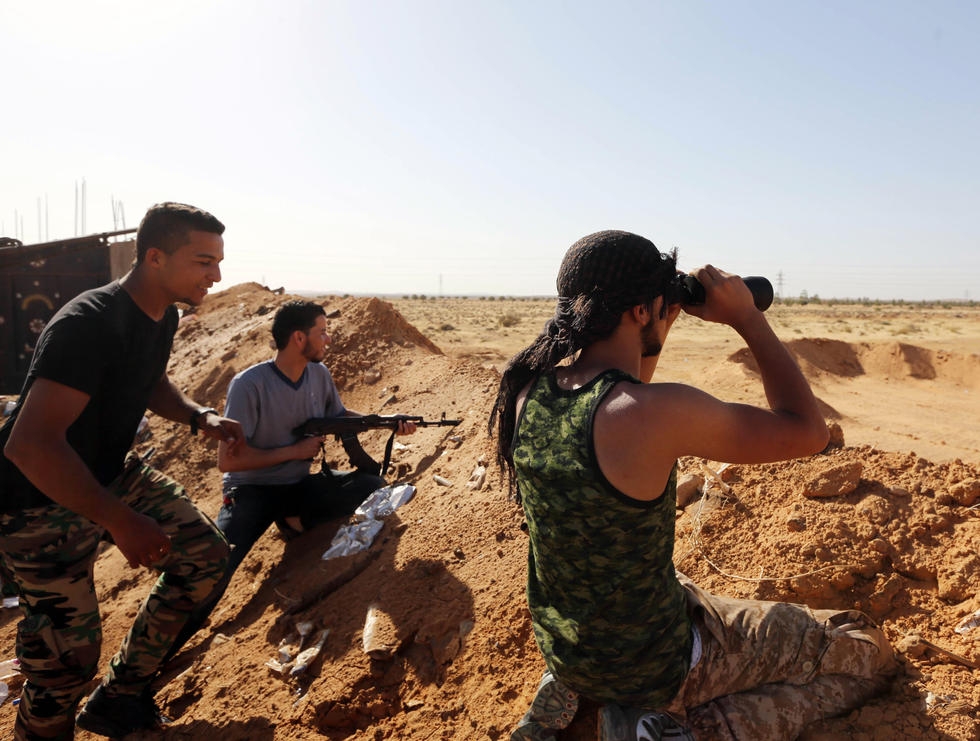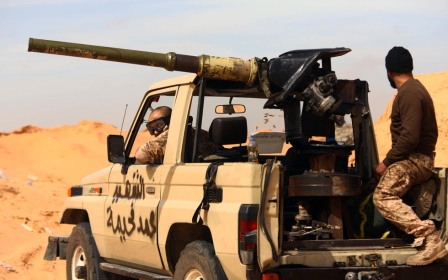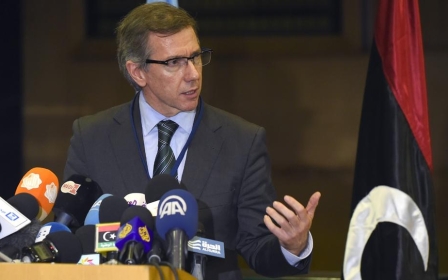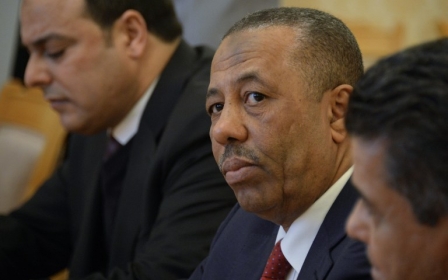ANALYSIS: Libya peace talks resume but can UN secure a deal?

The latest round of UN-sponsored Libya peace talks kicked off Wednesday, with the UN special envoy hoping to secure a last-ditch deal before the start of Ramadan.
Bernardino Leon has been talking tough ahead of the negotiations, taking place in Algiers, and expected to resume again for a final round of talks in Morocco on 7 June.
At the opening of the peace talks on Wednesday Leon said that “the country is really at its limit" and argued that not reaching an agreement was “not an option”. This followed on from comments made Tuesday when he stressed that there was now “an opportunity” because some 75 percent of groups were “supporting a political solution". Unnamed UN officials also told Reuters that the various groups had already agreed on 80 percent of the accord points.
However, optimism about the talks has generally been low, with analysts sceptical that a deal can be reached before the start of Ramadan on 17 June – the UN deadline. Events on the ground have also been threatening to unravel any progress at the negotiating table, with the Islamic State (IS) group gaining ground and die-hard factions in both the Tobruk and the Tripoli camps determined to secure a military victory.
Negotiated settlement
In order to bridge the deep divisions between the two camps, the latest UN-backed draft, expected to be released shortly, will have to offer both sides enough of a stake in the running of the country.
The last draft, submitted back in April, was accepted with some amendments by Tobruk but rejected outright by Tripoli, which called on Leon to resign and accused him of playing favourites.
According to Mattia Toaldo, a policy fellow at the European Council on Foreign Relations, the new draft will be a “balancing act” but the divisions between the two sides remain vast with Tobruk continuing to have “very high” expectations of what it will get.
“The sticking points are the institutional issue which [in the old draft] would see the new unity government answer only to the House of Representatives [HoR] in Tobruk – which to [Tripoli] sounds like they would be relinquishing all powers,” Toaldo told Middle East Eye.
“There is also an issue of who should be the commander in chief – the new PM or the presidential council which would be a wider format that would include some ministers. However, this is something which leads to a further sticking point - that of General [Khalifa] Haftar’s future.”
Haftar first returned to the spotlight in March last year when he launched his so-called Operation Dignity and vowed to root out Islamists and extremists from Libya. He initially began targeting factions like Ansar al-Sharia, but soon expanded his operation to include even more moderate groups like the Misratans.
While Hafter vowed to stay out of politics, he openly backed the Tobruk-based HoR after it was elected last June, and in March he was voted in as commander of the armed force by the HoR.
“Libya Dawn thinks he is the devil,” said security and policy analyst Wolfgang Pusztai.
With hatred running deep, Pusztai argues that it is unlikely that Tripoli will sign any deal allowing Haftar to hold onto control, with the HoR conversely likely to insist on Haftar having a continued role.
“For the HoR and in particular the federalists and the army, he [Haftar] is the only guy who can unite and lead them,” said Pusztai. “In March, there was an almost unanimous vote in his favour [at the HoR]. Those who did not vote did not participate in the discussions.”
“It is not realistic that the HoR would abandon him in exchange [for a peace deal]. For the time being Haftar gets Egypt support and he is the one who makes the deals with the Egyptians. The support from the Arab world goes straight to Haftar, not through the HoR. Even the tribes [in the east] are loyal to him.”
There are several factors at play, however, that could tilt the scales in favour of a deal in coming weeks and months even if the 17 June deadline comes and goes.
Shifting allegiances
“There is a lot of war weariness among the population,” said Richard Northern, a former British Ambassador to Libya and director of the RN4 Consultancy.
“We are seeing growing division between municipal authorities – who are more in touch with local opinion and much more likely to compromise and get some kind of working arrangement – and some of the militias in the [Tripoli-based] GNC [General National Congress] and the national politicians.”
“Leon is trying to exploit this with municipal council talks ... This might generate momentum. For now government players are saying that something might happen and crucially they are not as pessimistic as some of the press.”
Also, while Tobruk remains loyal to Haftar, it is possible to see some small cracks emerging. Pusztai thinks that representatives from the capital and the Tripolitania region surrounding the capital would be more likely to agree to a deal without Haftar, although he stresses that they remain a very small faction within Tobruk as most have fled.
Misrata, meanwhile, has been busy penning a string of ceasefires with local tribes, such as the al-Maqarbas in Wadi al-Shatti, helping them to cement their position.
A similar deal could now be on the table with the rival Zintani militias, which would significantly alter the balance of power.
The two groups were a major driving force during the revolution to oust former leader Muammar Gaddafi in 2011 but soon turned their guns on one another. The Misratans eventually pushed the Zintanis out of Tripoli last summer but since then there has been relative calm, and, according to analysts, serious negotiations about a truce are underway.
“Both the Zintanis and the Misratans have realised that they cannot win the war in Tripolitania,” said Pusztai.
“Misrata thought that they could, but since the rise of IS, they too have realised they do not have the forces to defeat Zintanis, so they are looking for a new strategy.”
The Zintanis, on the other hand, have had strained relations with the Haftar camp in the east and have been left isolated in western Libya, he explained.
While they could still wait it out to see if the tide turns decisively in Haftar’s favour, most analysts think that this is unrealistic with neither side likely to gain the upper hand.
Instead, much will depend on IS and internal Misratan politics.
“Whether they [Misrata] are willing to accept a ceasefire in Tripolitania will depend on what they are about to do with the Islamic State and what steps IS will take next,” said Pusztai.
“The problem for Misrata is that the fighting around Sirte was more or less only done by the 166 Brigade. Whatever was being discussed in terms of support for them [came to nothing] and there was no support at all on the ground,” he said in reference to Misrata’s pullback from IS-dominated Sirte last week.
According to Pusztai, the Misratans are internally split between those who want to side with IS to fight Haftar and those who want to pen some kind of national deal that would see Misratan and Libya Shield forces more actively fighting, rather than simply containing IS.
There have been some indications that the pro-deal camp could be winning out despite the 166’s withdrawal. Last month, more than 40 military brigades allied to Misrata held talks with Haftar’s camp in the east, calling for dialogue.
“Misrata also has a new and quite dynamic mayor who has held meetings with the UAE,” Toaldo said, in reference to the UAE leaders who are deemed to be big supporters of Haftar and accused of funnelling weapons and aircraft to his cause.
If IS chooses to try and branch out south and attack Misrata, this could also tilt the internal balance and force everyone to rally against IS, Pusztai argued.
However, if IS chooses to branch out and attack oil ports to the east, it could swing the tide against Haftar as he is forced to pull more forces from elsewhere to fight back IS, making Tripoli and the Misratans believe that they might be able to win the upper hand.
“It is quite worrying. IS were small and isolated but that they are now growing and expanding their areas of operations largely because the ability of the existing militias to fight them has been limited,” said Northern.
“I don’t think they [Misrata] see IS as a major threat yet but they are being naïve. IS will keep expanding as long as it doesn’t meet powerful resistance.”
Foreign meddling
The other key factor at play is the level of support from foreign powers. Arms smugglers in Turkey and Qatar have curtailed their shipments to the Misratans while the UAE and Egypt have been rumoured to have kept up their support to Haftar. This could soon change.
“They dynamics in the Gulf are shifting. Saudi Arabia has a different position now [under King Salman] than it had under the previous king [Abdullah] although it remains to be seen whether this will push Egypt to compromise on Libya,” said Toaldo.
But even if Riyahd does not force Egyptian President Abdel Fattah al-Sisi’s hand, there are signs that suggest Haftar could fall out of favour.
“Despite their help, Derna is being used as a base for many Egyptian groups [as well as IS] and Haftar has not been able to seal off Derna for Egypt,” said Pusztai.
“It is getting more likely that Egypt will conduct a limited operation in Derna – whether aerial bombardment or a limited ground incursion,” he added, while stressing that such an operation would need tacit US approval.
For now, however, there will be more of the same.
“Hostilities on the ground will continue much as now – inconclusive,” said Northern. “Neither side will be able to defeat the other but the tribal elders will continue to push for a bigger role and will try to get an agreement of some kind.”
In the meantime, the UN and Europe should keep up the negotiation efforts to make sure there “is a framework in place when all the sides decide to come to the table. We cannot risk losing the progress made and starting from scratch again,” warned Pusztai.
New MEE newsletter: Jerusalem Dispatch
Sign up to get the latest insights and analysis on Israel-Palestine, alongside Turkey Unpacked and other MEE newsletters
Middle East Eye delivers independent and unrivalled coverage and analysis of the Middle East, North Africa and beyond. To learn more about republishing this content and the associated fees, please fill out this form. More about MEE can be found here.




